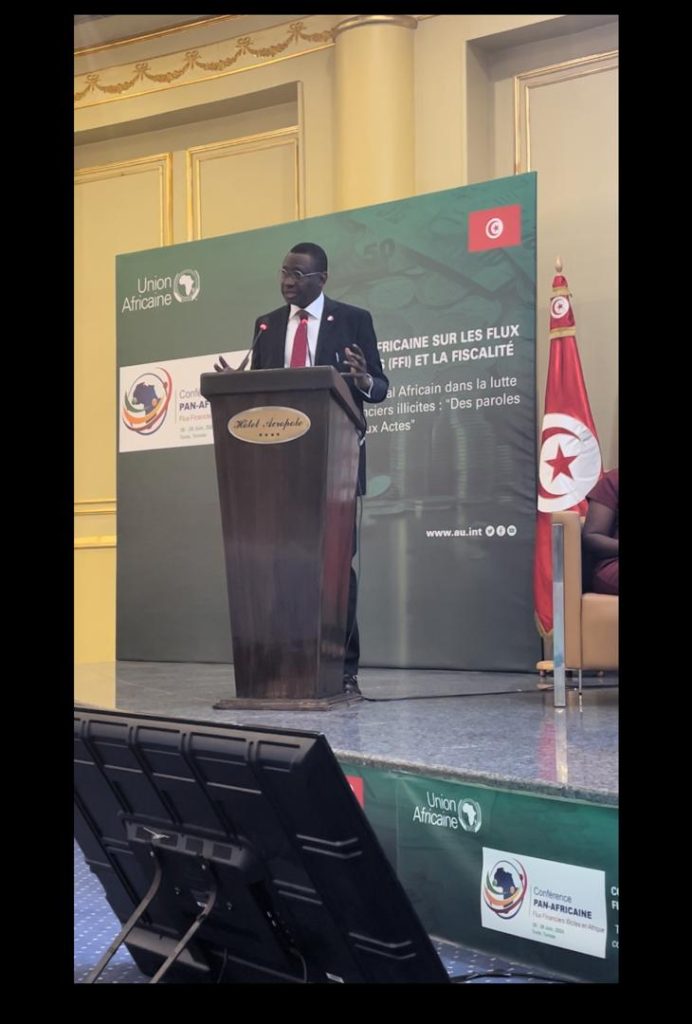Nigeria’s anti-graft agency’s chief wants African nations to embrace AI and blockchain technologies in curbing over $88.6 billion lost yearly to illegal financial transfers, according to the Economic and Financial Crimes Commission (EFCC).
Mr. Olanipekun Olukoyede, Executive Chairman of EFCC, who revealed the staggering annual loss of $88.6 billion to illegal financial transfers in Africa on Thursday during his keynote address at the Pan-African Conference on Illicit Financial Flows and Taxation in Tunis, Tunisia, said that technology can curb the menace.
The Nigerian anti-graft agency chief told attendees at the that there is an urgent need to embrace AI and blockchain technologies to combat these illicit activities, according to a statement by the EFCC.

Sharing success stories, Olukoyede cited Nigeria’s recovery of $311 million of the Abacha loot from the United States in 2020. This milestone was achieved through international collaboration and has funded significant infrastructure projects like the Second Niger Bridge and the Lagos-Ibadan Expressway. He detailed how these recovered funds are being utilised for developmental projects in line with the African Union’s Agenda 2063.
Mr. Olanipekun Olukoyede, Executive Chairman of Economic and Financial Crimes Commission (EFCC).
EFCC chief on ‘severe impact’ of Africa’s illicit transfers
Speaking on the theme “Africa’s Tax Agenda in Combatting Illicit Financial Flows: From Words to Action,” Olukoyede underscored the severe impact of these illegal transfers on Africa’s economic stability and development. He emphasized that the vast sums siphoned off each year could otherwise support crucial infrastructure, healthcare, and education initiatives across the continent.
According to Olukayode “over $88.6 billion is illicitly siphoned from the continent annually, funds that could otherwise be channelled towards critical infrastructure, healthcare, and education.”
The anti-graft agency’s chief advocated a unified continental stance among African nations. He also praised international cooperation efforts, notably the Stolen Asset Recovery Initiative (StAR) by the World Bank and the United Nations Office on Drugs and Crime (UNODC), as essential in facilitating asset recovery.
Sharing success stories, Olukoyede cited Nigeria’s recovery of $311 million of the Abacha loot from the United States in 2020. This milestone was achieved through international collaboration and has funded significant infrastructure projects like the Second Niger Bridge and the Lagos-Ibadan Expressway. He detailed how these recovered funds are being utilised for developmental projects in line with the African Union’s Agenda 2063.
Olukoyede also referenced outcomes from a recent high-level technical stakeholders meeting held in Addis Ababa from May 28-30, 2024. Organised by the African Union Advisory Board against Corruption (AUABC) and the African Union Commission – Political Affairs, Peace, and Security Department (AUC-PAPS), in collaboration with the GIZ Global Programme on Illicit Financial Flows (GP-IFF), the meeting focused on establishing the Pan-African Asset Recovery Practitioners Forum.
Addressing the obstacles in asset recovery, Olukoyede pointed out the technical, legal, and political challenges that complicate tracing, freezing, and repatriating illegal funds. He called for the strengthening of legal and institutional frameworks across African countries to better combat these financial losses. He emphasized the need for capacity building, robust legal frameworks, and enhanced coordination at national, regional, and international levels.
Olukoyede also advocated the use of advanced technologies such as data analytics, blockchain, and artificial intelligence to improve asset tracking and recovery efforts. He called for continuous advocacy and international pressure to ensure cooperation from tax havens and low-tax jurisdictions, stressing the importance of preventing resources from leaving Africa in the first place.
Furthermore, the EFCC chief said that the Pan-African Conference on Illicit Financial Flows and Taxation, held from June 26-28, 2024, aimed to tackle the significant challenge of these illegal transfers, which undermine economic development and governance in Africa. The event serves as a platform for sharing success stories, identifying obstacles, and formulating strategic recommendations to strengthen the continent’s capacity to combat these financial losses and reclaim its assets.
Source of Article


